Team Members
Marco Bernardi, Lisa Han, Rolien Hoyng, Ayan Rakoub, Jeroen VisserIntroduction
As smart cities have risen up around the world, the implementation of technological infrastructures and big data tracking systems has not been seamless. Each new smart city comes with a distinct set of challenges and concerns, whether that includes surveillance, cybersecurity, transit conflicts, or displacement and gentrification. Moreover, these critiques and controversies happen in many different spaces and levels of discourse.In order to derive an understanding of the sentiment, character, and geographical distribution of smart city critical discourse, we chose to analyze three specific platforms using a combination of digital methods to build query lists and visualize location-based data: Google, Twitter, and Amazon. Our hypothesis was that these three platforms would return distinct discursive spaces for news media (Google), user generated media (Twitter), and scholarly criticism (Amazon). This study pertains specifically to a platform analysis that cannot necessarily be extrapolated as a study of global discourse as a whole, especially because an analysis of Google and Twitter will exclude discourse from certain countries like China.
Research Question
What is the relationship between different platforms and their capacity to facilitate critical discourse of smart cities?
For Google, Twitter, and Amazon:-
To what degree is controversy about smart cities present globally? What about for the 5 case study cities?
-
What is the geographical distribution of smart city critique vs. general smart city buzz?
-
In what way do each of these platforms orient or focus critical discourse of smart cities?
Platform 1: Google
Methodology
1. GoogleScraper Analysis
- Input 7 Queries on GoogleScraper: Smart cities/Smart city; Smart city + Malta, + Santander, + Dubai, + Cairo, + Amsterdam. For the city queries, set results to 1000, the region to the correct country, and the domain to correct local domain.
- Manually annotate the raw file to mark all URLs with critical slant.
- Note distance from the top of search results for each of the critical URLs.
- Visualize the distances using Illustrator.
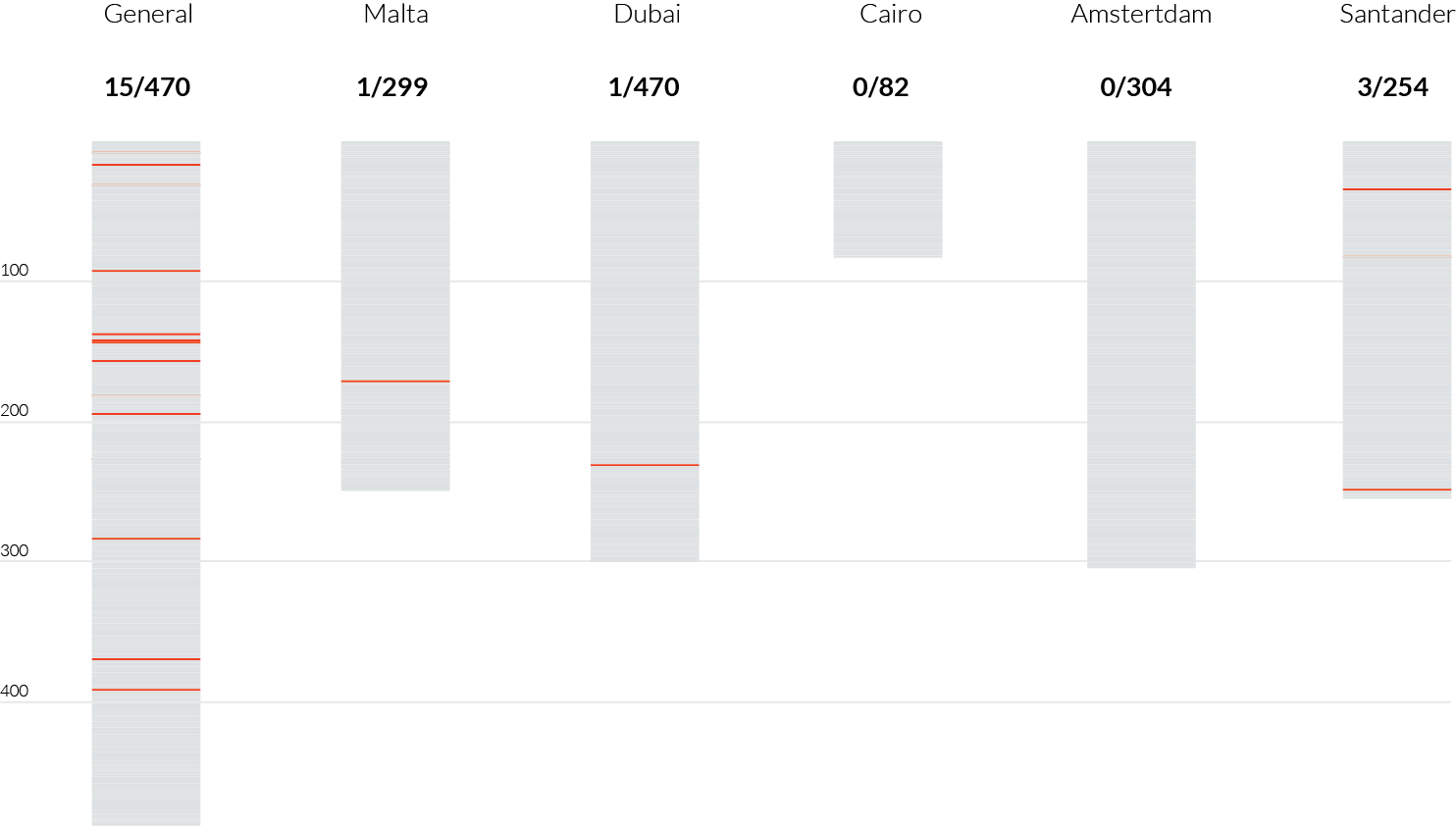
2. Map smart cities/smart city buzz and critiques from Google
- Take the dataset for smart city/smart cities and create two spreadsheets, one with critical URLs and one with the neutral URLs.
- Put both into DMIs geoIP tool, output CSV files
- Visualize both datasets on CartoDB
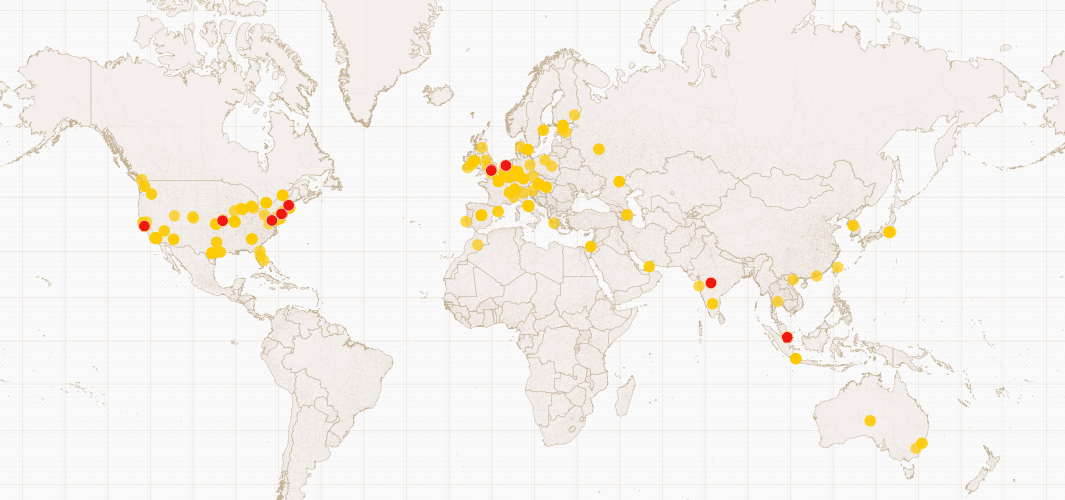 3. Key critical terms analysis
3. Key critical terms analysis - Take marked URLs from the 7 original queries and input into Issue Discovery
- Generate a master list of key terms revolving around critique of smart cities
- Grab the top 3 critical key terms from master list
- Use Googlescraper for smart city + city + key term for each city and each of the 3 key terms. Limit search to the country domain and correct region. Query in language of region. Also include global/non-city specific queries (smart city + key term).
- Count the number of results for each keyword/city combo and record in a spreadsheet
- Graph the results comparing the cities in Raw.
- Repeat Googlescraper, count, and graph but make all the settings .com and all regions. Use English.
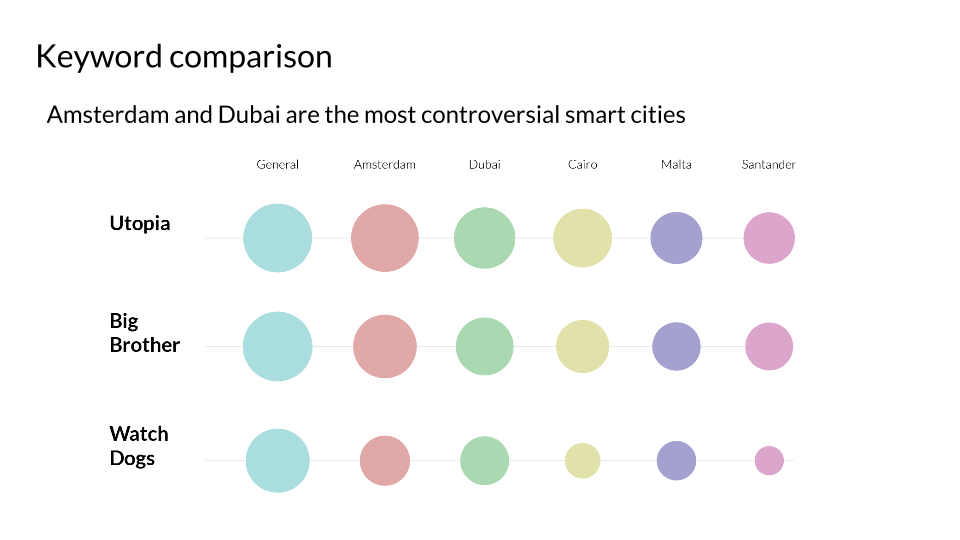 Findings
Findings
Geographically, the general buzz or overall discourse on smart cities is primarily situated within Europe and North America, although we acknowledge that our study is not accurate for Asia, as certain countries like China do not use Google. Controversy largely follows suit, but is particularly concentrated in India, Singapore, the United States, Netherlands, and the UK.
Within Google, the top critical keywords as retrieved from Issue Discovery are big brother, utopia, and watch dogs, taking on a distinct surveillance and privacy slant. Our initial analysis of these keywords within local Google domains showed us that there are far more conceptual, non-location specific controversy over smart cities than there are localized critiques of specific cities as smart cities. Our comparison with the .com results revealed that there are more global critiques of the five smart city case studies than there are internal critiques of the smart city within the cities themselves.
Platform 2: Amazon
Methodology
1. Google scrape on the site Amazon.com (top box) for [smart cities or smart city]. Set to top 100 results
- Output CSV and clean up the data to keep only the books
2. Grab the asin codes from the URLs of the books
3. Run a Amazon Recommendations (1 level) with the ASIN codes.
4. Visualize the network with Gephi:
- Showing out-degree;
- Identifying and naming clusters (typology);
- Identifying most recommended critical books, and relations with other titles.
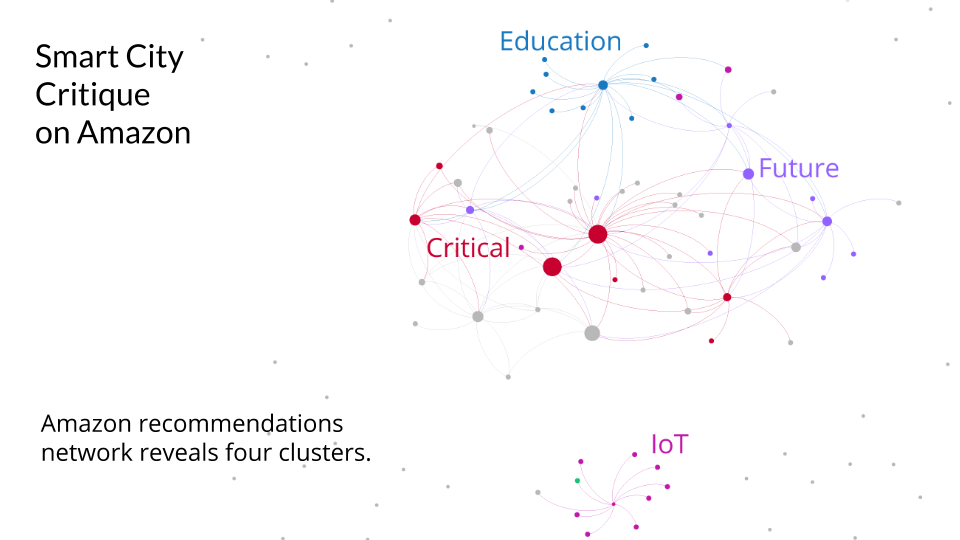
Findings
On the Amazon Recommendations graph, four clusters appear: one around education, one in which the future is central in the title, one central cluster that encompasses the more critical titles, and one separate cluster on the Internet of Things, which we assume results from algorithm settings.
.png)
Our focus is on the central cluster, where Townsends Smart Cities: Big Data, Civic Hackers, and the Quest for a New Utopia has the highest degree of out-going recommendations. The most critical recommendation is Greenfields Against the smart city, which in turn recommends CUNNING PLANS: Talks By Warren Ellis, which is interesting as Warren Ellis is a science-fiction writer.
In the centre, we also see a recommendation to a seminal title on urban planning: The Death and Life of Great American Cities by Jane Jacobs is regarded as a must-read on city planning. The other titles show alternative or extended approaches to Smart Cities, in that respect criticizing the monocultural corpo-technocratic approach around data and efficiency.
From the graph it is clear that two critical titles form a recommendations hub, leading to other critical titles and other Smart City books alike. From this observation one can conclude that critical discourse is alive on Amazon.
Platform 3: Twitter
Methodology
1. Take a random sample of 1000 tweets from the smart cities TCAT dataset
- Filter by tweets with user-identified location data
- Grab the locations for each dataset and input it into the find latitude and longitude tool. (sample tool: http://www.findlatitudeandlongitude.com/batch-geocode/#.VZ9-GPnGaL0)
- Graph both layers onto a map using different colors for critical vs. buzz.
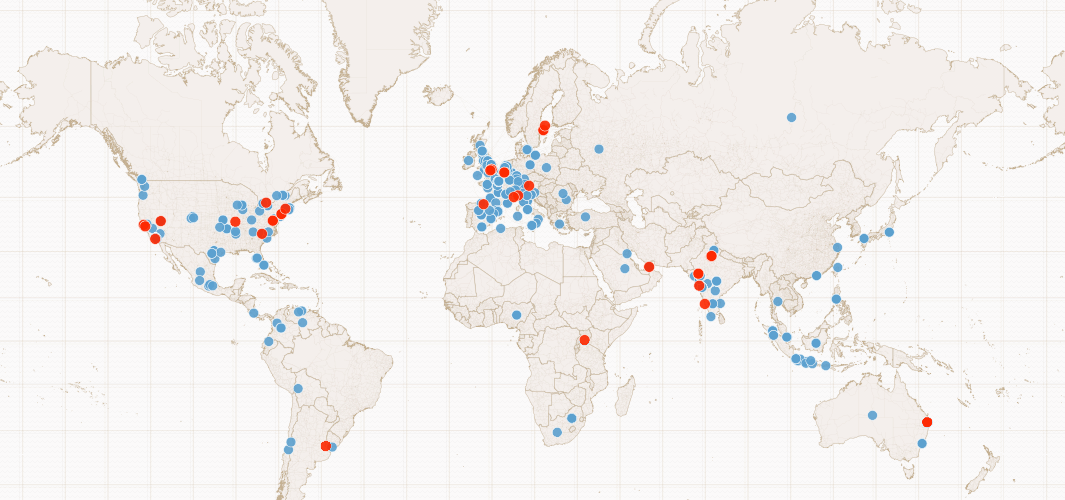 4. Make a word cloud of the most frequently used terms for the critical dataset.
5. Using the top terms from the word cloud, do another query on TCAT and output as a co-hashtag network on Gephi to see the organization of the discourse.
4. Make a word cloud of the most frequently used terms for the critical dataset.
5. Using the top terms from the word cloud, do another query on TCAT and output as a co-hashtag network on Gephi to see the organization of the discourse.
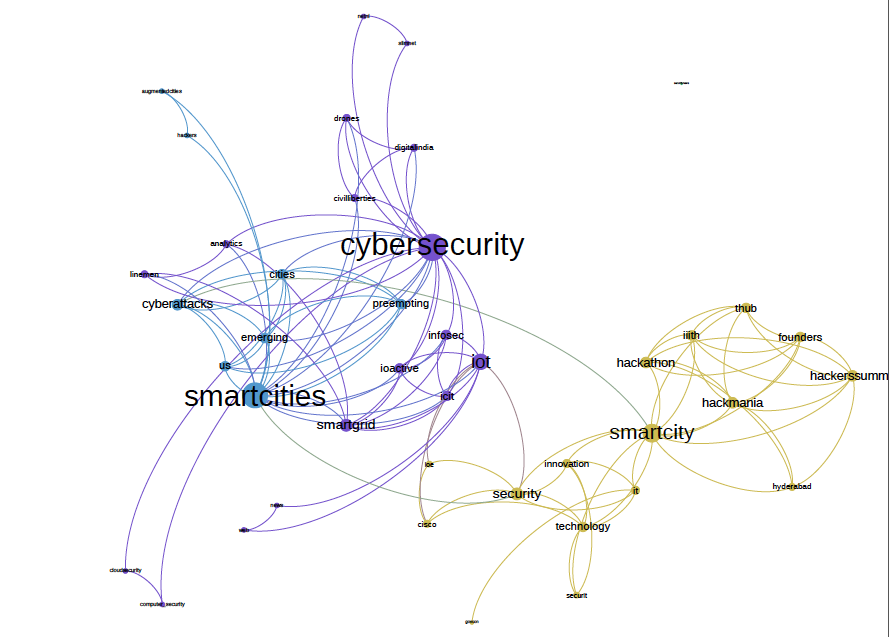
Findings
Among the commonly occurring terms on Twitter are cyberattacks, security, and hacking. Semantically distinct were unaware, citizens, and council. Like the google findings, Twitter is very concerned with privacy issues. However, Twitter critiques also appear to be more diverse, ranging from surveillance to civic awareness to infrastructure and energy concerns. Geographically, controversy and critique follow buzz rather closely.
Compared to Google, Twitter facilitates the emergence of instances of critique more frequently and with wider geographical spread. However, there are limitations to the studys capacity to show critique of smart cities as terms such as hackers can refer to cyberterrorism, DIY communities, or IT entrepreneurs and government collaborators. Further study is necessary to deal with this ambiguity.
Conclusion
Google mostly facilitates or hosts critique in the global domain (.com) more so than in local ones. Likewise, the discourse constitutes a general critique rather than a localized critique of particular smart cities. Critique follows the buzz, as both occur in the same areas. A shortcoming of our study is the reliance on Google and exclusion of engines that are popular in other parts of the world.
Amazon facilitates clear ideological positioning, again in a more general sense. Further study is necessary to determine to what extent critique is localized through for instance the presence of smart city critiques in local languages rather than translations.
Twitter generates instances of postings with a wider geographical spread compared to Google. However more postings are ambiguous rather than either clearly critical or buzz-like. The co-hashtag analysis including terms related to hacking shows its iteration in postings about security, innovation, and DIY. Last, it is interesting to note that the discursive focus on Twitter is distinct from the focus on Google: awareness and citizen participation (among the frequently occurring terms were: citizens, unaware, council, local) versus privacy (big brother).
All in all, these three platforms have different affordances and the critique they generate takes up different forms.
| I | Attachment | Action | Size | Date | Who | Comment |
|---|---|---|---|---|---|---|
| |
Screenshot_2015-07-10_16.47.16.png | manage | 138 K | 10 Jul 2015 - 14:47 | Main.lisahan | |
| |
Smart_City_Critique_presentation_(group_3).png | manage | 139 K | 10 Jul 2015 - 14:39 | Main.lisahan | |
| |
Top1000_ranking-01.png | manage | 55 K | 10 Jul 2015 - 14:32 | Main.lisahan | |
| |
Top1000_ranking.pdf | manage | 247 K | 10 Jul 2015 - 14:31 | Main.lisahan | |
| |
Top1000_ranking.png | manage | 30 K | 10 Jul 2015 - 14:33 | Main.lisahan | |
| |
Twittermap.png | manage | 221 K | 10 Jul 2015 - 14:36 | Main.lisahan | |
| |
gephiamazon.png | manage | 68 K | 10 Jul 2015 - 14:40 | Main.lisahan | |
| |
gephy_cyberattacks_Cybersecurity_Hackers.pdf | manage | 17 K | 10 Jul 2015 - 14:46 | Main.lisahan | |
| |
googlemap.png | manage | 218 K | 10 Jul 2015 - 14:29 | Main.lisahan | |
| |
keywords_image.png | manage | 32 K | 10 Jul 2015 - 14:40 | Main.lisahan |
 Copyright © by the contributing authors. All material on this collaboration platform is the property of the contributing authors.
Copyright © by the contributing authors. All material on this collaboration platform is the property of the contributing authors. Ideas, requests, problems regarding Foswiki? Send feedback


